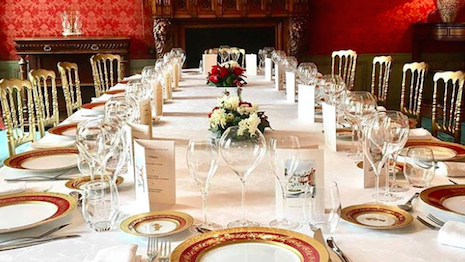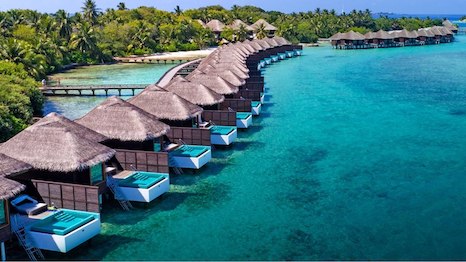 The global ban on straws is in effect immediately. Image credit: Peninsula Hotels
The global ban on straws is in effect immediately. Image credit: Peninsula Hotels
As travelers become more environmentally conscious, luxury hotel brands are introducing more sustainability initiatives that prove hospitality does not need to sacrifice upscale experiences to achieve ecological and social responsibility.
Hospitality groups such as the Peninsula Hotel and Marriott International have been increasingly transparent with their guests about their newest sustainability efforts, which aim to benefit people and the planet. Environmental efforts do ultimately impact brands' bottom lines, whether through additional expenses or appealing to more travelers.
"Sustainable tourism needs to be seen as a lifestyle, not a trend," said Tiffany Dowd, founder and president of Luxe Social Media, Boston. "While sustainability efforts may not be the first reason a guest chooses a hotel, today’s traveler appreciates that hotels are introducing more environmentally-friendly practices beyond asking guests to reduce water consumption.
"While sustainable luxury may seem like an oxymoron, today’s definition of luxury for travelers continues to change," she said. "It’s an intelligent kind of luxury with more local and meaningful experiences and no longer senseless luxury that impacts the environment."
Sustainable strategy
Hotel groups must first consider the logistical implications before introducing new environmentally-conscious practices.
"The greatest challenge in introducing new and expanding sustainability efforts is that there is not one clear definition on what being sustainable means," said Lisa Holladay, global brand leader for The Ritz-Carlton. "For each subject — whether that be carbon, waste, sourcing — there are many different routes to approach a challenge.
"We start by looking at where our operations can make the most impact," she said.
Single-use plastics, particularly disposable plastic straws, have drawn ire from environmental groups as they contribute to plastic ocean waste, despite their small size.
Taj Hotels Resorts and Palaces has launched its first “Zero Single Use Plastic Hotel,” the Taj Exotica Resort & Spa, Andamans. The resort, which was built following sustainable construction practices, features a plastic collection center and an on-site water bottling plant.
Taj Hotels shares the importance of its plastic-free hotel
The Indian hospitality group is also eliminating plastic straws and replacing plastic-wrapped dry amenities in its rooms, such as toothbrushes, with eco-friendly substitutes.
"The most widely seen eco-friendly initiatives in luxury hotels are those that go primarily unseen by the guest: programmable power to the room, replacing single-use plastics, etc.," said Taylor Rains, managing partner at Flugel Consulting, Charleston, S.C. "These initiatives make a huge impact on sustainability but cause little to no changes in guest behavior."
Earlier this summer, Peninsula Hotels instituted a ban on the use of disposable plastic straws, effective immediately. The ban is part of the hotel’s plan to transition away from all single-use plastics by 2020 (see story).
Hotel groups need to protect the pristine environments that travelers venture to. Image credit: Marriott International
Hotel group Marriott International will also stop the use of plastic straws and stirrers at its 6,500 hotels around the world, potentially eliminating more than 1 billion straws worth of plastic waste over the next year.
Marriott’s shuttering of straws is consistent with this campaign and the hotel group’s larger efforts to limit waste. For instance, Marriott also recently began replacing disposable plastic bottles of shampoo and conditioner in showers with built-in dispensers that use far less waste (see story).
More recently, Mandarin Oriental, Hong Kong has unveiled its own sustainable choice in the form of reusable glass bottles and an on-site water filtration system.
Previously, the hotel would use plastic, disposable water bottles by the cases, but now water is served in reusable glass bottles meant to significantly lower the output of plastic waste from the property. Additionally, Mandarin Oriental also filters water on-site, allowing customers to easily refill their existing bottles rather than having to get a new plastic one each time they want more water (see story).
Sustainability also extends to what is on the menu at hotels, with restaurants opting for ingredients such as cage-free eggs and locally sourced seafood.
"Adopting sustainable initiatives can mean changing elements of a guest's stay to which they may have grown accustomed.," Mr. Rains said. "[These practices] should be folded into the overall brand identity of the hotel and presented as an enhancement to the experience."
Natural resources
Many eco-friendly practices are dependent on resorts' locations and surrounding environments.
"Each Ritz-Carlton property is unique and the teams at all of our hotels have their own programming, projects and trainings to guide them in how to be conscious of the world around us," Ritz-Carlton's Ms. Holladay said. "As a global brand, we have the unique opportunity to be a driving force in the mission to respect and take care of our natural ecosystems, and it is a responsibility we take seriously."
For instance, Ritz Kids programming introduces children ages 4 to 12 to environmental adventures. The initiative is guided by four pillars: water, land, environmental responsibility and culture, which are broad enough to let each property take a fresh approach to the programming.
Since all the brand's properties are embedded in unique locations, the programming inevitably varies from place to place. Partnerships include environmentalist Jean-Michel Cousteau’s Ocean Futures Society and a Tesla Experience with energy challenges at Lake Tahoe (see story).
Other luxury resorts rely on renewable energy sources, including solar power and hydropower. In regions known for wine production, some resorts have introduced “cork exchange programs” in which used wine corks are traded for tree saplings, which are later planted to help rehabilitate the surrounding native forest.
Traveling is an increasingly popular way for people to give back, and hotel brands must stay on top of the trend to maintain their status as the best in the business.
A study by Tours.com found that an astonishing 55 percent of America-based travelers partook in volunteer work during a vacation within the past two years, with almost three quarters calling their charitable donations or philanthropic endeavors “important,” “very important” or “extremely important.” As “voluntourism” becomes increasingly common, brands must show that they care equally and assist travelers in partaking in volunteer work or gifting to maintain status and image (see story).
"Guests are looking to find deeper connections with destinations, learn from foreign cultures and observe wildlife in its natural habitat," Ms. Dowd said. "Hotels do not have to compromise luxury and comfort, but need to be mindful that guests want to feel like they are making some kinds of positive impact when traveling."
Sustainability in travel has surpassed being just a trendy benefit when it comes to staying at a luxury hotel or resort, and now directly affects booking decision-making.
As environmental issues become not just a hot button topic in society, but also a main driver in how many consumers behave, travel is also becoming a large part of that conversation. A survey from AIG Travel shows that consumers are now making their travel decisions based on the sustainability of the hospitality brands (see story).
According to the Responsible Luxury Initiative, companies should protect resources by using less and recycling more, using business strategies and philanthropic efforts to positively benefit society and being transparent about their progress to engage more investors and consumers. Luxury hospitality brands can also use their influence to promote the development of more innovative and sustainable materials.
Luxury companies should also evaluate how their products and services are impacting society and the environment. By articulating their values to stakeholders, companies will build trust and goodwill (see story).
"Sustainability is a tricky initiative for luxury brands," Mr. Rains said. "It's an extremely important element of business today, weighing heavily on a good many guests planning stays, but has the potential to detract from the level of offerings a property can offer its guests."
Travelers, however, have shown appreciation for the environmental efforts in the hospitality industry.
"We receive a great deal of positive feedback from our guests as well as suggestions for programming we could implement," Ritz-Carlton's Ms. Holladay said. "It makes us proud that our guests express how happy they are to be part of our journey to drive responsibility through the luxury travel industry."

